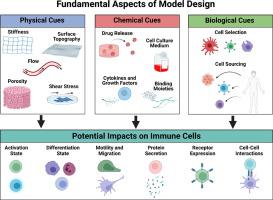Advanced Drug Delivery Reviews ( IF 15.2 ) Pub Date : 2022-01-11 , DOI: 10.1016/j.addr.2022.114111 Jennifer H Hammel 1 , Jonathan M Zatorski 2 , Sophie R Cook 2 , Rebecca R Pompano 3 , Jennifer M Munson 1

|
Advances in 3D cell culture, microscale fluidic control, and cellular analysis have enabled the development of more physiologically-relevant engineered models of human organs with precise control of the cellular microenvironment. Engineered models have been used successfully to answer fundamental biological questions and to screen therapeutics, but these often neglect key elements of the immune system. There are immune elements in every tissue that contribute to healthy and diseased states. Including immune function will be essential for effective preclinical testing of therapeutics for inflammatory and immune-modulated diseases. In this review, we first discuss the key components to consider in designing engineered immune-competent models in terms of physical, chemical, and biological cues. Next, we review recent applications of models of immunity for screening therapeutics for cancer, preclinical evaluation of engineered T cells, modeling autoimmunity, and screening vaccine efficacy. Future work is needed to further recapitulate immune responses in engineered models for the most informative therapeutic screening and evaluation.
中文翻译:

设计用于测试和评估治疗的体外免疫活性组织模型
3D 细胞培养、微尺度流体控制和细胞分析的进步使得能够开发出更多与生理相关的人体器官工程模型,并精确控制细胞微环境。工程模型已成功用于回答基本生物学问题和筛选疗法,但这些模型往往忽略了免疫系统的关键要素。每个组织中都有免疫元素,有助于健康和疾病状态。包括免疫功能对于炎症和免疫调节疾病治疗的有效临床前测试至关重要。在这篇综述中,我们首先讨论了在设计具有免疫能力的工程模型时要考虑的物理、化学和生物学线索的关键组成部分。下一个,我们回顾了免疫模型在癌症治疗筛选、工程化 T 细胞临床前评估、自身免疫建模和筛选疫苗功效方面的最新应用。未来的工作需要进一步概括工程模型中的免疫反应,以进行最有信息量的治疗筛选和评估。











































 京公网安备 11010802027423号
京公网安备 11010802027423号